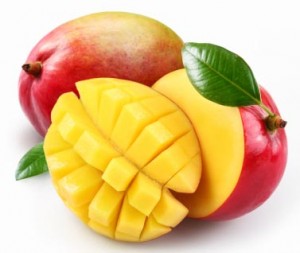
More evidence that low-calorie sweeteners are bad for your health
Studies show that artificial sweeteners can raise the risk of hypertension, metabolic syndrome, type 2 diabetes and heart disease, including stroke.

Mangoes are a tropical treat any time of day.
While you may love them for their sweet juicy taste, did you also know they are tremendously good for you as well?
Throughout Asia the mango has both spiritual and medicinal significance. It is the national fruit of India, Pakistan and the Philippines.
An average sized mango contains up to two thirds of the daily recommended intake of vitamin C. Vitamin C plays a key role in boosting the immune system. This reduces the risk of diseases such as cold and flu.
Mangoes are rich in beta carotene a powerful antioxidant that helps reduce the effects of oxidative stress on many body systems including the skin and eyes the eye. This plays a roles in preventing age related macular degeneration, which leads to worsening vision during older age.
Mangoes (along with papaya, pineapple and kiwi fruits) contain enzymes which aid the breakdown and digestion of protein. They also add fibre to your diet, which feed good bacteria in the gut keeping your digestive tract working efficiently. Dietary fibre has more long-term benefits, as well lowering your risk of developing colon cancer, heart disease, type-2 diabetes and diverticular disease.
They also contain tryptophan the amino acid that calms the nervous system and helps induce sleep – this may be one reason behind their reputation as a ‘happy’ fruit.
Newly discovered benefits
Recently scientists have begun looking more deeply at the healing potential of mangoes particularly with regard to gut problems like colitis, and come up with some interesting findings, albeit through initial animal research.
A preliminary study from the Texas A & M University investigated the effects of mango (and pomegranate) polyphenolic antioxidants on gut bacteria and short chain fatty acid (SCFA) production in rats. Dysfunctional interactions between gut bacteria and the immune system are thought to be involved in triggering colitis.
In the study the animals were administered placebo, mango, or pomegranate juice, and were exposed to three cycles of 3% dextran sulphate sodium (DSS, a harsh salt solution that can be used to induce effects similar to colitis in laboratory research) followed by a two-weeks recovery period.
Both juices decreased the level of pro-inflammatory substances called cytokines.
Mango juice specifically induced beneficial changes in SCFAs production by bacteria in the gut.
Short chain fatty acids are necessary to increase blood flow and ileal motility (the rate at which food moves the small intestine) in the gut. Indeed a diet low in what is known as ‘resistant’ starch and fibre – that is carbohydrates that are not easily digested and which help to feed friendly bacteria in the gut, which mangoes help supply – may explain the high incidence gut problems in the West.
The pomegranate juice was found to induce beneficial changes in the composition of bacteria in the gut by increasing the population of anti-inflammatory species.
Another from the same university explored the anti-inflammatory effects and possible protective effects of mango and pomegranate juice in DSS-induced colitis in rats. As in the previous study the rates were given wither a placebo, or mango or pomegranate juice. Both fruit juices reduced inflammation in the colon compared to control juice.
Protect your bones
Another study from Oklahoma State University, examined the effects of mango and its polyphenol in preventing bone loss [sarcopenia] in mice who had had their ovaries removed, a model for postmenopausal osteoporosis. The findings suggest that mango supplementation can actually help maintain skeletal health in cases where estrogen is deficient.
So enjoy your mangoes. Make sure they are organic, to avoid the numerous pesticides that would be used on the otherwise and here’s a final tip: Studies suggest that the bioavailability of the beta carotene contained in mangoes (and papaya) improves between 19-38% when the fruit is blended with milk or dairy – so why not add some to your smoothie!?

Please subscribe me to your newsletter mailing list. I have read the
privacy statement